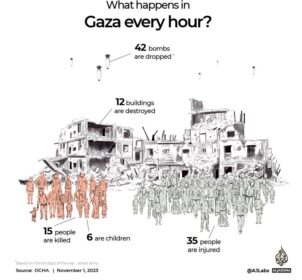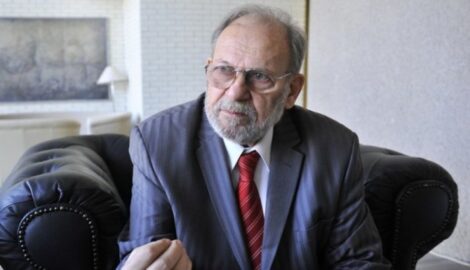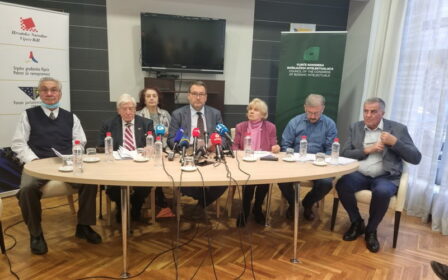Bosnian doctor repays kindness the AF showed her as a girl

In December 1993, 11-year-old Merima White fled her home in Sarajevo with her family and a single material possession — a stuffed polar bear bought from an Olympics souvenir shop nearly a decade before.
Sarajevo, Bosnia, was a city under siege. For a year and a half, its residents had endured artillery attacks and sniper fire aimed at schools, hospitals and civilians as they scouted for water and stood in line for food. Teachers built classrooms in the basements of abandoned shopping centers.
Electricity came sporadically. Grown-ups made candles out of oil and water, with wicks fashioned from shoelaces. They filled bathtubs with water, when water ran. When it didn’t, they walked for miles to find it, usually under the cover of heavy fog and at the risk of injury or death.
A tragedy — her father’s injuries in a bombing while helping deliver water — led to the White family’s evacuation from the city that December. It also set White on a path to become a doctor in the U.S. Air Force.
Two decades after her family’s perilous departure, White, a captain in the 99th Medical Operations Squadron Family Medicine at Nellis Air Force Base, Nev., is in her final year of training to become a doctor.
“I decided to go into medicine during the war,” she said in an interview with Air Force Times. “I got to see the worst and the best humanity had to offer. To me, the best was the medical personnel that day after day risked their lives to save kids and families from attacks by sniper fire and artillery. I hung onto that … in all the badness we saw.”
City under siege
White grew up the younger of two girls in a close-knit, hardworking family. Her mother was a dental technician. Her father managed a Sarajevo brewery. They spent weekends with extended family — aunts, uncles, cousins and grandparents. They hiked and skied in the nearby mountains. In summer, they vacationed on the Adriatic.
Education was important to the Whites. That made one April morning in 1992 all the more unusual. White wanted to go to school. Her mother told her she had to stay home. Serbian paramilitary forces had surrounded the city, she learned, and White’s parents feared for her safety.
Looking back now, she remembers the change in the atmosphere around Sarajevo. The adults seemed distracted, even worried. They spent a lot of time watching the news on TV.
“The first few days, you just knew something was wrong. You’re not going to school. They wouldn’t let us go outside to play,” White recalled. “A couple of days later, we had the first casualty.”
A medical student was killed during a peaceful protest, she said.
As the siege dragged on day after day, residents tried to restore some sense of normalcy. White went to school in a makeshift classroom inside an abandoned shopping center where a fire pit kept the children warm. Studies were interrupted periodically by artillery fire.
But even these hidden schools weren’t safe. A bomb fell on a classroom White was headed to. She still hears it whistling overhead, the boom, boom, boom that followed. From around the corner, White saw smoke. She reached for the doorknob, silently pleading for the classroom to be empty.
It wasn’t. Inside, White saw blood and limbs, her teacher’s hair on the blackboard. She doesn’t remember how many people were killed in the attack — perhaps three children and the teacher, who later would have a school named after her.
The classroom bombing was one of at least two attacks White narrowly escaped with her life. The other was an artillery attack that blasted shrapnel into her father’s legs as they waited in line for food.
“When you’re little,” White said, “your dad is Superman. Having to watch him, … that memory is still really vivid for me.”
Her father couldn’t walk for months. When he finally recovered, he hopped aboard a truck to help deliver water to homebound families. The truck was bombed, her father ejected onto a railroad track.
It was too dangerous to wait for medics. There were no stretchers or backboards. He was loaded into the car and taken to a makeshift hospital, where, unable to move on his own, he was expected to die within five days.
On the sixth day, White was allowed to visit her father. She and her uncle ran through a sniper alley to reach him. In the hospital, White tried to throw her arms around her dad. “Everyone was like, ‘Stop, don’t!’ He wasn’t moving anything but his eyes.”
But her father began to get better, eventually even regaining some sensation in his body. A group of volunteer medical workers from Doctors Without Borders suggested the family travel to the United States. With the right medical care, they said, he might someday walk again.
First, White, her parents and her sister would have to risk their lives to get out of the city. They left in an armored vehicle.
“We had to sign a waiver that if we got pulled over we’d be handed over for execution, which could mean anything: A concentration camp, rape or execution. As a kid, it’s hard to process that. But you know what’s been going on.”
Loss compounded her fear. She was leaving her home, her extended family, her neighbors and friends — people who had come together to help each other and make the best of a life spent under siege.
Once they safely boarded the aircraft, though, White felt a rush of joy at the possibilities ahead.
“I knew my dad was going to be able to get the health care he needed,” White said. “I was very excited for that. He was my superman and I wanted him to be better.”
‘American dream’
The trip to the U.S. took a couple of weeks. Along the way, the family made stopovers at Air Force bases.
“People were very professional and kind,” White recalled. “It was the first kindness my family and I had seen in a long time.”
She would never forget the Air Force members, or the doctors who had made their evacuation possible, or the neurosurgeons who did their best to care for her father at the hospital in Arizona where they ended up.
Her father could now move his upper arms but couldn’t hold or grasp anything with his hands or fingers — and he wasn’t going to get any better, the doctors told the Whites. Despite first-rate care, he would not walk again, and paralysis had permanently robbed him of the ability to write, to grip a fork, to care for himself.
In April 1995, three years after the siege had begun, White’s parents decided to return to Sarajevo. But they wanted their children to have the best chance at a future free from war and suffering. White’s sister was an adult now. She was going to school and working for a refugee resettlement organization and able to care for her younger sister.
So the White daughters stayed in the U.S. and their parents went home, where the siege would drag on until February 1996. At least 5,000 civilians died in the violence. Ten times as many were wounded. Many of the victims were children. The population of the once-glimmering Olympic city had plummeted. Thousands of homes and buildings were damaged or destroyed. Life in Sarajevo, White’s parents recognized, would be a daily struggle.
“It was the ultimate sacrifice for them,” White said. “They wouldn’t get to see us grow up and be there for us. They were really worried about having their kids in a foreign country no matter how amazing it was. They had all the faith in us, and that really pushed us.
“It was hard. All my friends, obviously their parents got to come to a lot of things and mine couldn’t. My sister was now essentially my parent. We couldn’t bicker like regular siblings,” White said. “She was amazing. We sort of taught each other. We did well.”
White earned a scholarship to college. Her sister graduated from college, got a job in finance and started a family in Arizona. The sisters talk or text several times a day. They visit their family in Sarajevo whenever they can. Her father’s condition has improved little.
At Nellis, White treats airmen who are just out of technical training, retired veterans and just about everyone in between.
“They tell you all sorts of amazing stories. You get to help them work through whatever they need us to,” White said.
She also treats their family members. “It’s very humbling. They support all of us when we deploy overseas. They keep the home front strong.”
White will graduate from her residency in family medicine in June. After that, she hopes to teach at a residency.
“Ideally, I’ll get to share my love of family medicine and all it entails when new residents come through, and also learn from them. Part of being a doctor is also teaching your patients and sharing knowledge with colleagues,” White said. “That’s my goal for right now. So we’ll see.”
She wants to stay in the Air Force. “I’m just really grateful to this country and to the military,” White said.
“I generally prefer to look forward. Obviously, everything that happened to me helped make me who I am. In remembering what happened, it keeps me strong and centered and reminds me of what’s important in life — having amazing family and friends and having a career that makes a difference. Living every day to its fullest and not taking anything for granted. Knowing that all of it could be gone tomorrow. Every day, I wake up and put a smile on my face. I am honestly living the American dream.”



